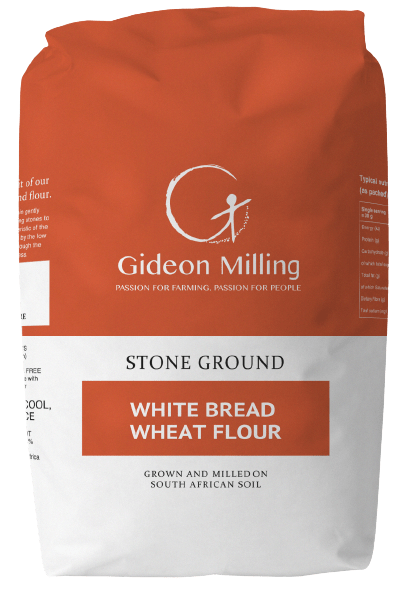Our Story
Gideon, from the book Judges in the Old Testament, was threshing wheat in a winepress to protect his hard-earned harvest from the raids of the enemy. While he was taking action “the Angel of the Lord appeared to him, and said to him, ‘The Lord is with you, you mighty man of valor!’” (Judges 6:12). This is where the story of Gideon, a judge in his time begins and, in a sense, so too the story of Gideon Milling.
Gideon Milling was birthed as a vision, a dream, to transform the way farmers relate to the retail sector by having more direct involvement in their produce through the value chain, and to be able to provide good quality, healthier products to consumers at affordable prices.
The plan is to grow this Kingdom business to one of influence in the marketplace. To start a business like Gideon Milling in a sector where big brands have been established for years might have seemed foolish for some, but like Gideon in the Bible with his small band of men, God has shown His favour in divine connections and opportunities, bringing together the right people at the right time.
We see a strong connection between faith and farming, while holding true to our passion for people and the products we bring to the market. Gideon Milling is a wheat flour mill and operates from Sacks Circle, Bellville in Cape Town.
The strength of the mill lies in the relationship between the owners and their passion for South African agriculture and combined knowledge of wheat farming. Even though South Africa has always had a strong agricultural industry, the ever-changing global economy, fluctuating currency and stock markets, and various added costs in the value chain, it has become increasingly difficult for both farmers and consumers to absorb these increases in costs and food prices. It was in this context that the idea was born for a group of wheat-farmers to co-operatively own and operate their own mill and produce high-quality products at a comparatively affordable rate, and in so doing benefit both the farmers and the consumers.
A growing number of health-conscious consumers do not want genetically modified food products, and Gideon Milling shares that philosophy. The wheat grown and processed is thus GMO free, and will remain so in the future. Crops are grown in an environmentally conscious way, using no-till sowing and crop rotation methods with various crop-varieties being grown in a seasonal cycle. This method of crop-rotation enriches the soil, naturally infusing it with the nitrates, phosphates and minerals needed to encourage earthworms and other biological processes.
Gideon Milling produces stone ground flour. The two mill stones grind at slower speeds and generate heat of no more than 36° – 38°C, which means the protein stays intact. The result is a healthier, more digestible flour. There has been several consumers who have reported that despite being gluten intolerant, they have had no negative effects from using Gideon Milling’s flour. This is likely due to the process used.
To ensure that the flour remains as healthy and natural as possible the mill is very selective when it comes to buying wheat and none of the wheat purchased is genetically modified. We procure our wheat from areas where minimum tillage is practiced, in essence biological farming that is based on a crop rotation system. In the West Coast, Southern Cape, and Swartland areas the farmers plant canola in year one, lupins (a legume) in year two, and wheat in year three. This process repeats itself with the seventh year being a rest year.
Canola grows very tall and creates a canopy above the soil which prevents weeds from growing and producing more seed, so fewer chemicals are needed. The lupins in year two are a natural source of nitrogen for the soil, thus less fertilizer is applied.
A large percentage of farmers use chicken manure, which is spread over the land before the planting season, thus decreasing the fertilizer application during the season. When the wheat is planted you have a clean seed bed and healthy soil. During the process of harvesting the straw is chopped and spread out by the combine-harvester and this material rots into the soil after a few months.
The no-till regime (no ploughing; the top layer does not get turned over) reduces or eliminates soil erosion. No-till increases the amount and variety of life in and on the soil, including disease suppression organisms.
The major benefit of no-tillage is improvement in soil biological fertility, making soils more resilient. In consequence, farming operations are more efficient, speeding up sowing time, and less fossil-fuels are used.
South African farms
Jobs in Gideon Milling chain
Tons of flour produced per year
So, Why Stone Ground?
There are many advantages to stone ground wheat flour. The endosperm, bran, and germ remain in their natural, original proportions. Because the stones grind slowly, the wheat germ is not exposed to excessive temperatures. Heat causes the fat from the germ portion to oxidize and become rancid and much of the vitamins to be destroyed. Since only a small amount of grain is ground at once, the fat from the germ is well distributed which also minimizes spoilage. Nutritive losses due to oxygen exposure are also limited by the fact that stone ground flour is usually coarser. As expressed in The Bread Book (Leonard, 1990), stone ground flour is preferred by many bakers and natural food advocates because of its texture, its sweet and nutty flavour, and the beliefs that it is nutritionally superior and has a better baking quality than steel-roller-milled flour.
Read the full research article here.
The Gideon Milling Approach
We have invested in the best stone ground milling equipment used by reputable mills across the world that are famous for their high quality, tasty stone ground flour. Here is a list of why we believe in stone grinding our flour:
- Healthy alternative due to high dietary fibres
- Preserves natural flavour and goodness
- Grinds all the natural vitamins, minerals, and ballast substances
- It is the traditional grinding method
- Allows baking without further processing
- Stone ground flour has a larger surface increasing the ability to absorb liquid, giving an airy and elastic dough that is easy to work with
- Our millstones are made exclusively from natural materials such as emery, flint, and magnesite

Growers' Journey
Join us as we embark on our Growers’ Journey to show you the seasons our growers go through each year.




